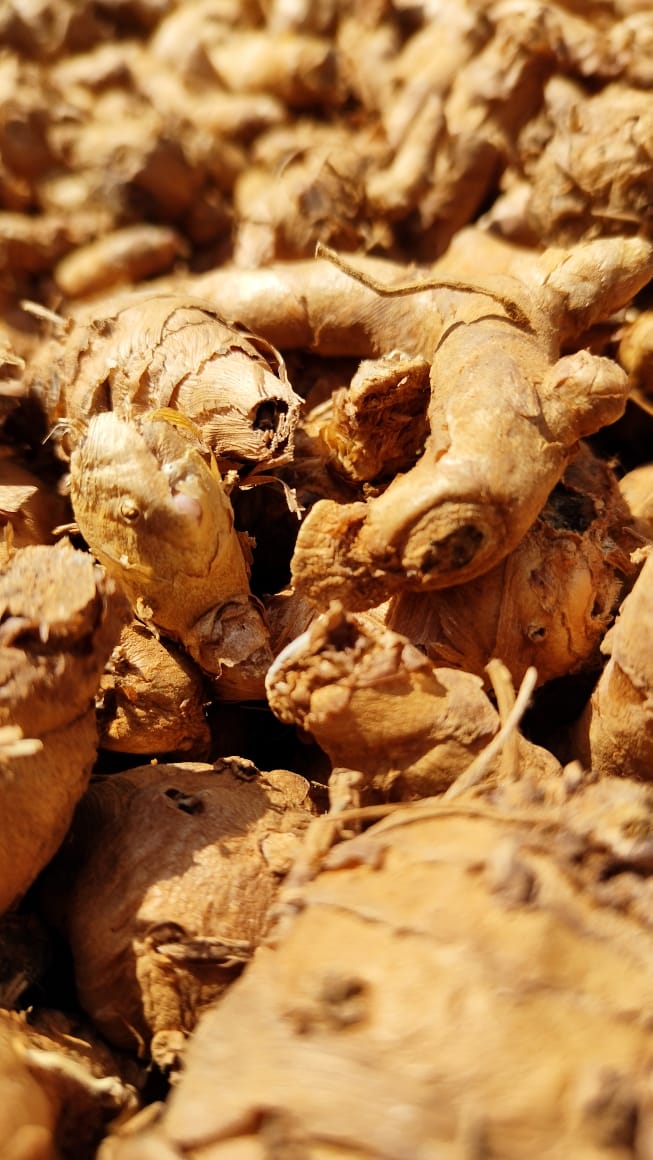Unlocking the Golden Secrets: The Incredible Health Benefits of Turmeric Revealed!

Introduction: Turmeric, also known as Curcuma longa, is a yellow-orange spice commonly used in Indian and Asian cuisine. But this humble spice is more than just a flavor enhancer – it’s also packed with powerful health benefits. For centuries, turmeric has been used in traditional medicine for its anti-inflammatory, antioxidant, and immune-boosting properties. In recent years, modern science has caught up, and numerous studies have shed light on the incredible health benefits of turmeric. In this blog post, we will explore the various ways in which turmeric can benefit your health and wellness, backed by scientific evidence.
Table of Contents:
- What is Turmeric?
- Turmeric’s Nutritional Profile
- Turmeric’s Active Compound: Curcumin
- Health Benefits of Turmeric a. Anti-inflammatory Properties b. Antioxidant Effects c. Immune-Boosting Properties d. Brain Health and Cognitive Function e. Heart Health f. Digestive Health g. Joint Health h. Skin Health and Beauty i. Weight Management j. Diabetes Management k. Cancer Prevention and Treatment
- How to Incorporate Turmeric into Your Diet
- Precautions and Considerations
- Conclusion
What is Turmeric?
Turmeric is a perennial herbaceous plant native to South Asia, primarily India and Indonesia. It belongs to the ginger family and is characterized by its vibrant yellow color and earthy, slightly bitter flavor. Turmeric has been used for centuries in Ayurvedic and traditional Chinese medicine for its medicinal properties and is also widely used in culinary applications, adding a warm and aromatic flavor to dishes.
Turmeric’s Nutritional Profile: Turmeric is packed with essential nutrients that contribute to its health benefits. It is an excellent source of dietary fiber, vitamins and minerals, including manganese, iron, potassium, and vitamin B6. It is also low in calories and fat, making it a healthy addition to any diet.
Turmeric’s Active Compound: Curcumin: The key bioactive compound in turmeric responsible for its health benefits is curcumin. Curcumin is a polyphenol that gives turmeric its distinctive yellow color and is known for its potent anti-inflammatory, antioxidant, and immune-boosting properties. Curcumin is also believed to have various other health benefits, making turmeric a true superfood.
Health Benefits of Turmeric:
a. Anti-inflammatory Properties: One of the most well-known health benefits of turmeric is its anti-inflammatory properties. Curcumin in turmeric has been shown to inhibit inflammation by reducing the activity of enzymes that cause inflammation in the body. Chronic inflammation has been linked to various health issues, including chronic diseases such as heart disease, diabetes, and cancer. Including turmeric in your diet may help reduce inflammation and promote overall health.
b. Antioxidant Effects: Curcumin is also a potent antioxidant, meaning it can neutralize harmful free radicals in the body that can cause oxidative stress and damage to cells. Oxidative stress has been implicated in the aging process and the development of various diseases. Turmeric’s antioxidant effects can help protect against oxidative damage, supporting healthy aging and overall wellness.
c. Immune-Boosting Properties: Turmeric has long been used in traditional medicine for its immune-boosting properties. Curcumin in turmeric has been shown to enhance the immune system by modulating immune cells and their responses, helping to protect against infections and promote optimal immune function. Regular consumption of turmeric may help support a healthy immune system.
d. Brain Health and Cognitive Function: Curcumin hasbeen found to have potential benefits for brain health and cognitive function. Studies have shown that curcumin can help improve memory, reduce oxidative stress in the brain, and enhance the production of brain-derived neurotrophic factor (BDNF), a protein that plays a crucial role in the growth and maintenance of neurons. Turmeric’s brain-boosting properties may help support cognitive function and protect against age-related cognitive decline.
e. Heart Health: Turmeric has been shown to have potential benefits for heart health. Curcumin in turmeric has been found to help reduce LDL (low-density lipoprotein) cholesterol, often referred to as “bad” cholesterol, and triglyceride levels, which are risk factors for heart disease. Additionally, curcumin has been shown to have antiplatelet and anti-thrombotic properties, which can help prevent blood clots and improve overall cardiovascular health.
f. Digestive Health: Turmeric has long been used in traditional medicine for its digestive properties. Curcumin in turmeric has been found to help stimulate the production of bile, which is important for the digestion of fats, and has been shown to have potential benefits for gut health. Turmeric’s digestive health benefits may include reducing symptoms of indigestion, improving gut motility, and supporting a healthy gut microbiome.
g. Joint Health: Turmeric has been used for centuries in Ayurvedic medicine for its potential benefits for joint health. Curcumin in turmeric has been shown to have anti-inflammatory and antioxidant properties that can help reduce inflammation and oxidative stress in joints, thereby supporting joint health and mobility. Regular consumption of turmeric may help alleviate joint pain and discomfort associated with conditions such as arthritis.
h. Skin Health and Beauty: Turmeric has been used for its potential skin health and beauty benefits for centuries. Curcumin in turmeric has been found to have anti-inflammatory and antioxidant properties that can help reduce skin inflammation, protect against UV-induced skin damage, and promote overall skin health. Turmeric can also help improve skin complexion, reduce the appearance of scars and dark spots, and promote a youthful and radiant complexion.
i. Weight Management: Curcumin in turmeric has been found to have potential benefits for weight management. Studies have shown that curcumin can help increase metabolism, reduce the accumulation of body fat, and inhibit the growth of fat cells, which may aid in weight loss efforts. Turmeric’s weight management properties may help support a healthy body weight and promote overall wellness.
j. Diabetes Management: Turmeric has been shown to have potential benefits for managing diabetes. Curcumin in turmeric has been found to help improve insulin sensitivity, reduce insulin resistance, and regulate blood sugar levels, which may be beneficial for individuals with diabetes or at risk of developing diabetes. Turmeric’s diabetes management properties may help support blood sugar control and overall metabolic health.
k. Cancer Prevention and Treatment: Curcumin in turmeric has been extensively studied for its potential anti-cancer properties. Curcumin has been found to have anti-inflammatory, antioxidant, and anti-cancer effects, which may help prevent the development and progression of cancer cells. Curcumin has been shown to have potential benefits in various types of cancers, including colon, breast, prostate, and lung cancers. However, more research is needed to fully understand the potential benefits of curcumin in cancer prevention and treatment.
How to Incorporate Turmeric into Your Diet:
There are various ways to incorporate turmeric into your diet to reap its health benefits. Here are some ideas:
- Use turmeric in cooking: Turmeric can be added to a wide range of dishes, such as curries, soups, stews, stir-fries, roasted vegetables, and sauces, to add flavor and color.
- Make turmeric tea: Turmeric tea, also known as golden milk, is a popular beverage that combines turmeric with other spices, such as ginger and cinnamon, and can be enjoyed hot or cold.
- Add turmeric to smoothies: Turmeric can be added to smoothies for an extra health boost. Simply blend turmeric with other fruits, vegetables, and liquids of your choice to create a delicious and nutritious drink.
- Take turmeric supplements: Turmeric supplements are available in various forms, such as capsules, tablets, and powders. It’s important to consult with a healthcare professional before taking any supplements to determine the right dosage and ensure safety.
Conclusion: In conclusion, turmeric is a powerful spice with numerous health benefits. Its active compound, curcumin, has been shown to have anti-inflammatory, antioxidant, anti-cancer, and other therapeutic properties that may promote overall health and well-being. From reducing inflammation and oxidative stress to supporting brain health, heart health, digestive health, joint health, skin health, weight management, diabetes management, and potentially preventing cancer, turmeric can be a valuable addition to your diet. Incorporating turmeric into your daily routine through cooking, tea, smoothies, or supplements can be an easy and delicious way to enjoy its health benefits. Embrace the natural goodness of turmeric and harness its health benefits to support your overall wellness journey.
Frequently Asked Questions (FAQs) about the Health Benefits of Turmeric:
- What are the health benefits of turmeric? Turmeric has numerous health benefits, including its anti-inflammatory, antioxidant, immune-boosting, brain health, heart health, digestive health, joint health, skin health, weight management, diabetes management, and potential cancer prevention properties. Its active compound, curcumin, is responsible for many of these benefits.
- How does turmeric help with inflammation? Curcumin in turmeric has been shown to possess anti-inflammatory properties that can help reduce inflammation in the body by inhibiting the activity of inflammatory enzymes and molecules.
- Can turmeric help with skin health and beauty? Yes, turmeric has antioxidant properties that can protect the skin from damage caused by free radicals, promoting healthy and glowing skin. It also has anti-inflammatory properties that may help with skin conditions such as acne and eczema.
- Can turmeric help with weight management? Turmeric has been found to potentially aid in weight management by boosting metabolism, reducing inflammation, and improving insulin sensitivity, which can help regulate blood sugar levels and support weight loss efforts.
- How can I incorporate turmeric into my diet? You can incorporate turmeric into your diet by using it in cooking, making turmeric tea or golden milk, adding it to smoothies, or taking turmeric supplements. .
- Can turmeric interact with medications? Yes, turmeric may interact with certain medications, especially those that are blood-thinning or antiplatelet drugs. It’s crucial to consult with a healthcare professional, especially if you are taking any medications or have underlying health conditions.
- Is turmeric safe for everyone to consume? While turmeric is generally considered safe when consumed in moderate amounts as a spice in food, it’s important to consult with a healthcare professional, especially if you are pregnant, breastfeeding, have liver or gallbladder issues, or are on medications.
- Can turmeric help with diabetes management? Turmeric has been found to potentially aid in diabetes management by improving insulin sensitivity, reducing inflammation, and supporting blood sugar regulation.
- Can turmeric help prevent cancer? There is evidence to suggest that curcumin in turmeric may have anticancer properties and could potentially help in cancer prevention. However, more research is needed, and it’s not a substitute for conventional cancer treatment. Consult with a healthcare professional for personalized advice.
- Can turmeric be used as a natural remedy for various health issues? Turmeric has been used as a natural remedy for centuries in traditional medicine for various health issues. However, it’s important to consult with a healthcare professional for proper diagnosis, treatment, and safety.
At Bagdara Farms, we take immense pride in cultivating the finest turmeric in the world, specifically for medicinal use. Our farm is located in the heart of Bandhavgarh, a tiger reserve known for its rich biodiversity. By ordering turmeric from us for your health needs, you are not only benefiting from its healing properties but also contributing to our conservation and social efforts. We promote sustainable farming practices that support the conservation of wildlife and their natural habitat. Your purchase helps us continue our mission of promoting the well-being of both humans and nature, making it a truly rewarding choice for your health and the environment.

